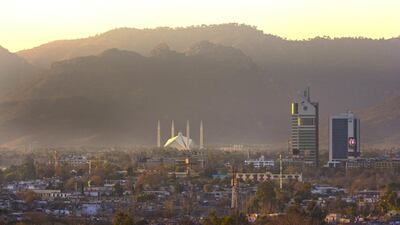Why Islamabad?
Like other purpose-built capital cities, such as Australia’s Canberra, Islamabad has the unfortunate reputation of being a dreary city of technocrats and politicians; a place where people come to work, as opposed to live.
However, over the past decade or so, the city has undergone quite a rebirth, to become one of Pakistan's best assets. A potent indicator of its newfound zest is Islamabad's vibrant cultural scene. The Lok Virsa museum is one of the best in the country, and the National Art Gallery stands as a bright contemporary space that is home to a fine collection of art and sculpture. Since 2013, the city has even acquired its own annual literature festival to stand alongside those in Karachi and Lahore.
However, even amid all the new sparkle, the city retains many of its original charms; sprawling parkland, tranquil streets and an all-round pleasantness that seduces people from all over an otherwise frantic country.
A comfortable bed
At the foot of the Margalla Hills, the Marriott is Islamabad's premier hotel. In 2008, it made headlines for all the wrong reasons after a bomb attack killed more than 50 people. However, following a brisk renovation and heightened security measures, it has reclaimed its reputation. Double rooms cost from about US$374 (Dh1,374) per night, including taxes.
The Serai Boutique Hotel sits in the heart of one the city's more upscale neighbourhoods. Its 13 bedrooms lack wow factor, but still possess touches of flair, and offer a contemporary and relaxed living space. The highlight is the all-white rooftop terrace, where guests can order food from the hotel's signature restaurant while taking in views of the Margalla Hills. Doubles cost from 12,000 Pakistani rupees (Dh422), including taxes.
Find your feet
Though more pedestrian-friendly than most other Pakistani cities, Islamabad is still not ideal for walking, except for the shortest distances.
Instead, take the time to explore the labyrinth of trails that run through the Margalla Hills, and cater to the needs of all types of walkers. The most strenuous track is Trail 3, which opens up on Margalla Road and ends at the summit of Pir Sohawa. Easier alternatives include Trails 1 and 2.
Meet the locals
Since opening its doors as a not-for-profit social enterprise in 2010, Kuch Khaas has fast become the creative and cultural hub of the city, hosting talks, concerts, art installations, book launches and even Islamabad's first farmers' market. It's also home to one of the best cafes in town and an art gallery. Likewise, the Nomad Art Gallery and Cultural Centre holds similar events and initiatives through which visitors can interact with Islamabad's creative talents.
Book a table
Though they offer high-quality lunch and dinner accompanied by the best bread rolls in the city, Street 1 Café's real calling card is their breakfasts. Almost always full, with a lively al fresco dining area, expect to pay 1,500 rupees (Dh53) per head.
In Saidpur Village, Andaaz takes its inspiration from the history of the subcontinent to bring diners the finest cuisines of the region. With brown brick walls, locally made blinds and plenty of handicrafts, the look matches the indigenous food. Be sure to try the paneer tikka, achaar gosht and chooza makhani. A meal for two costs about 4,000 rupees (Dh141).
For street food, try the relatively new Maantu Gul Kitchen, a small, ramshackle dhaba adjacent to the Faisal Mosque's car park, offering sumptuous parathas. A meal for two costs about 1,200 rupees (Dh42).
Shopper’s paradise
Despite a recent deluge of western-style malls, Islamabad’s shopping scene is still dominated by its marakaz, large retail squares found in each of the city’s sectors where you can buy anything from the latest designer clothes to bootleg DVDs. Jinnah Super in F7 is the busiest and best-known.
Book-lovers should make a beeline for one of the capital’s charming “old book” shops, where they can spend hours sifting through shelves and shelves of heavily used paperbacks in search of their favourite authors.
Couture enthusiasts can spruce up like a local with a kurta from Islamabad's various branches of the popular fashion chain Khaadi.
Don’t miss
Forty kilometres away from Islamabad lies the ancient archaeological site of Taxila. Eighteen of the excavated ruins are on the Unesco World Heritage List, and date to as far back as the second century BC, when the city was one of the most important posts of the Gandhara civilisation. Apart from a tour of the museum, the best archaeological remains can be seen at Sirkap and Julian, including temple markets and a monastery.
What to avoid
The Monal Restaurant in the Margalla Hills resort of Pir Sohawa has a reputation as one of the best eateries in the city, mainly because of the views it offers diners.
However, the food, while good, is criminally overpriced, and the building is a clunky eyesore that sits incongruously amid its bucolic setting. Definitely one to miss.
Getting there
Etihad and Emirates fly direct from Abu Dhabi and Dubai to Islamabad from Dh1,500 return, including taxes.
weekend@thenational.ae

